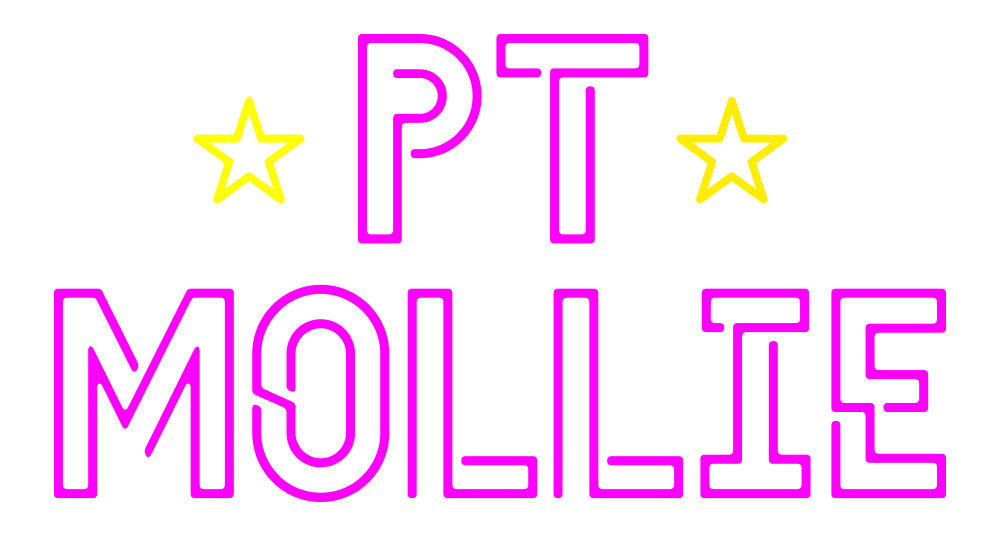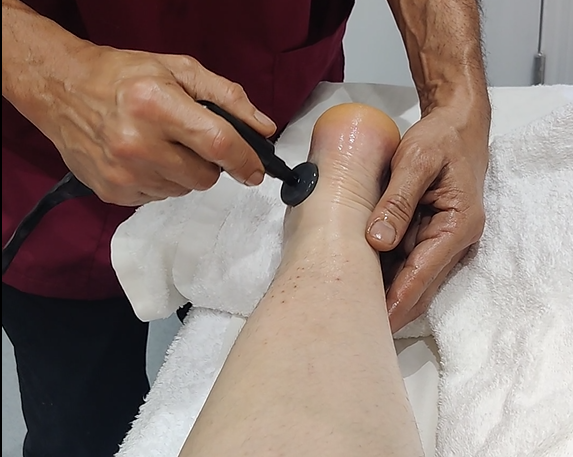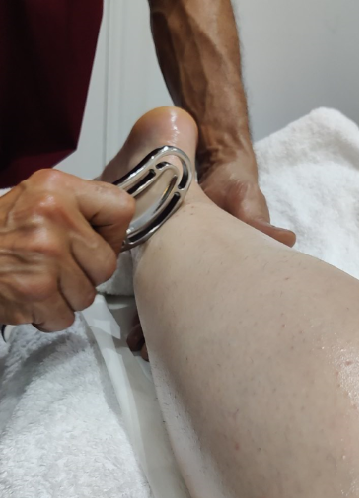Congratulations to everyone who completed the London Marathon and Manchester Marathon yesterday! If you ran the Boston Marathon on 21 April, hopefully you’re starting to feel better after a few days of recovery. No matter where you are in your running journey, post-marathon niggles, aches, and injuries are common. Pushing your body to achieve new goals is part of the process — but it’s crucial to stay on top of any running injuries to prevent them from disrupting your training. Poorly timed injuries, especially in the final month before a big race, can also add unwanted pressure. (I always seem to crave running even more when I’m injured and can’t!) Rather than risk training through the pain, you should consider radiofrequency therapy and high-power laser therapy for fast, effective recovery. Both treatments are pain-free, non-invasive, and ideal for healing both while training for a race and post-marathon recovery. Normally, I rely heavily on my osteopath, but after a recent ski injury impacted my work, I needed a faster solution to restore my range of motion in my shoulder. That’s when I discovered Indiba radiofrequency therapy and K-Laser treatments at the Wellness and Beauty Clinic in West Hampstead, London. After just four sessions over four weeks, my rotator cuff injury has healed significantly. Curious about how radiofrequency and high-power laser therapy can help you recover faster after a marathon? Read on to learn more.
How does it work?
Indiba radiofrequency therapy uses a 448 kHz electromagnetic current to gently warm tissue deep beneath the skin. This bio-stimulation activates cellular repair, increases blood flow, and accelerates healing. It’s particularly useful for injuries that traditional physio or massage can’t fully address—like those in tendons or ligaments, which often have limited blood flow and take longer to heal. High-power laser therapy (K-Laser) complements this by delivering light energy that further promotes cell regeneration and reduces inflammation. Runners hate being injured but also never want to miss a training session because of injury. It is a fine line to cross as we lack patience and don’t want to loose our fitness. The bio-stimulation caused by the radiofrequency therapy helps with pain relief, increases deep blood flow via vascularization. Treatment can be given on the same day as the injury and professional athletes often receive multiple sessions per day to ensure quick turnaround between races or training cycles.
Chronic vs. Acute Injuries: My Experience as a Runner
My first experience with K-Laser and Indiba was for a chronic Achilles tendinopathy that’s plagued me since my early 20s. After every soccer game or speed session, I could barely walk. And yes—I’ve been told to do eccentric heel raises… but do I actually do them? Not really.
I had my Achilles, heel, and calves treated first with K-Laser* to warm up the tissue, followed by Indiba to boost circulation. Since the Achilles has very poor blood flow, these therapies are a game-changer for encouraging healing. The day after my session, I noticed I wasn’t as stiff in the morning and had less discomfort after an easy 5K. If you’re dealing with old injuries or conditions like plantar fasciitis, these treatments can finally help you turn a corner. In hindsite, I should have booked more than one session to focus on healing my Achilles!
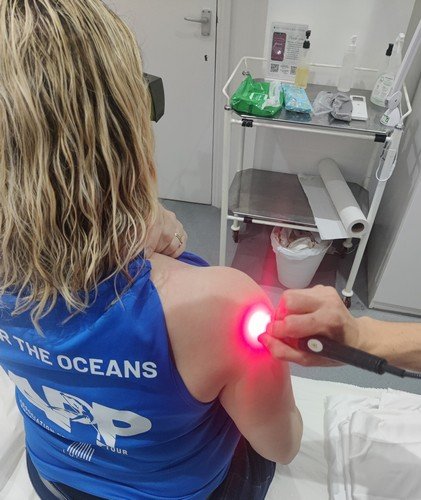
Treating a Rotator Cuff Injury: Weekly Progress
For my recent rotator cuff injury, I’ve been attending weekly therapy at the clinic. The shoulder joint is incredibly complex, with multiple overlapping muscles and tendons. Massage alone can’t reach these layers—but radiofrequency therapy can. During each session, Francisco assesses my range of motion, performs gentle mobilizations, and combines K-Laser and Indiba to stimulate healing at different tissue depths. We always finish with another range of motion test—and the improvement is instant. It is amazing to me how rapidly I have seen progress. It makes me wish I can booked in straight away after my accident rather than waiting six weeks to seek help.
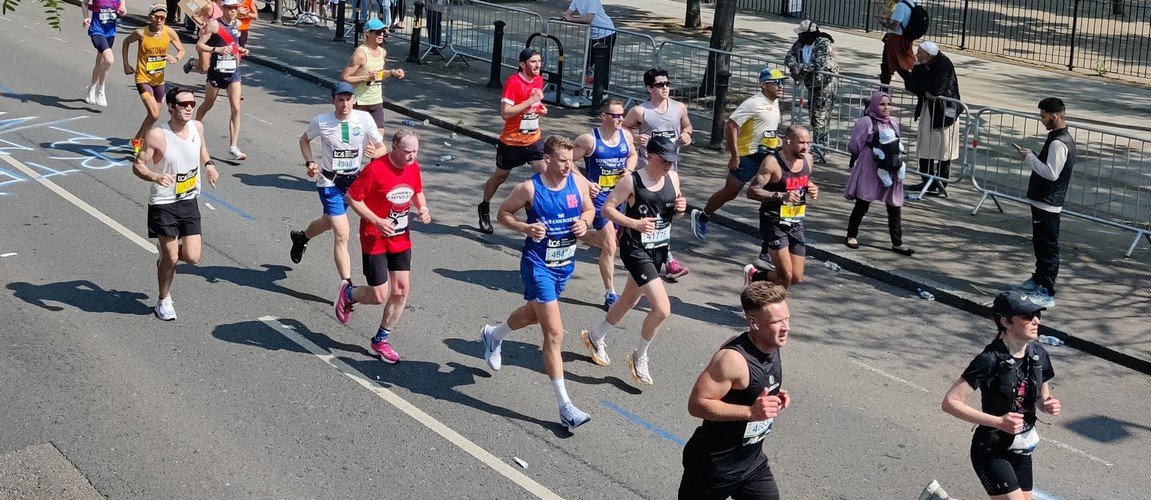
Recover Faster, Run Sooner
What do I love most about this new technology? These treatments are completely passive and non-invasive. I’m not a fan of painful sports massages, especially right after a marathon. With this method, you can usually return to light exercise the very next day—perfect if you’re lining up for another event or just don’t want to lose fitness. In my experience, you’ll recover faster and perform better in your next race with these therapies than without any intervention at all.
Ready to Feel Better Fast?
Don’t let a minor injury become a major setback. Whether you’re dealing with post-race soreness, a recurring issue, or prepping for your next marathon—this is your recovery shortcut. The current marathon recovery package with Vitruvian Sports Therapy includes massage, assisted stretching and/or radio frequency therapy, depending on what the problem is and what your therapist thinks would be the best course of action. These sessions are £60 for a 45 minute appointment and will be held at the Wellness and Beauty Clinic in West Hampstead, London. You will not regret it.
*Thanks to the Wellness and Beauty Clinic for the discounted sessions. All opinions are honest and my own.
